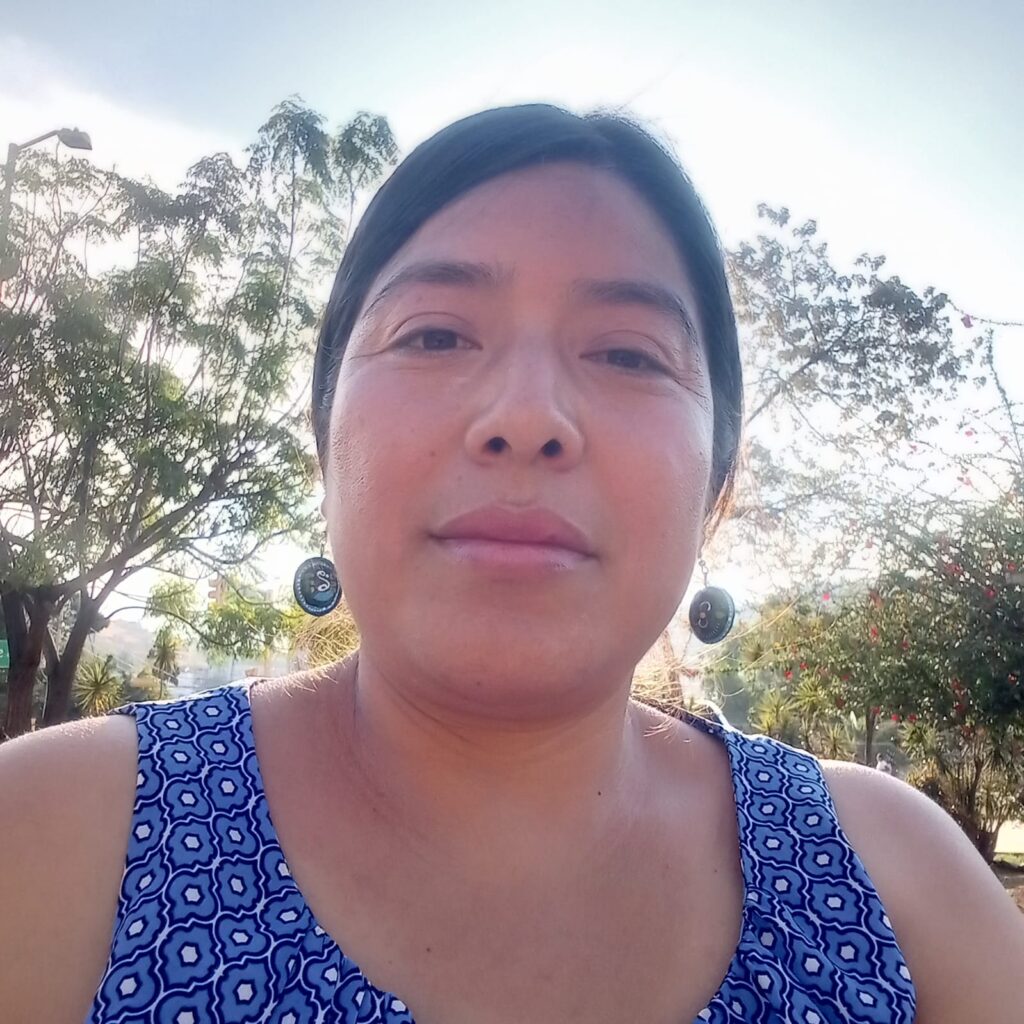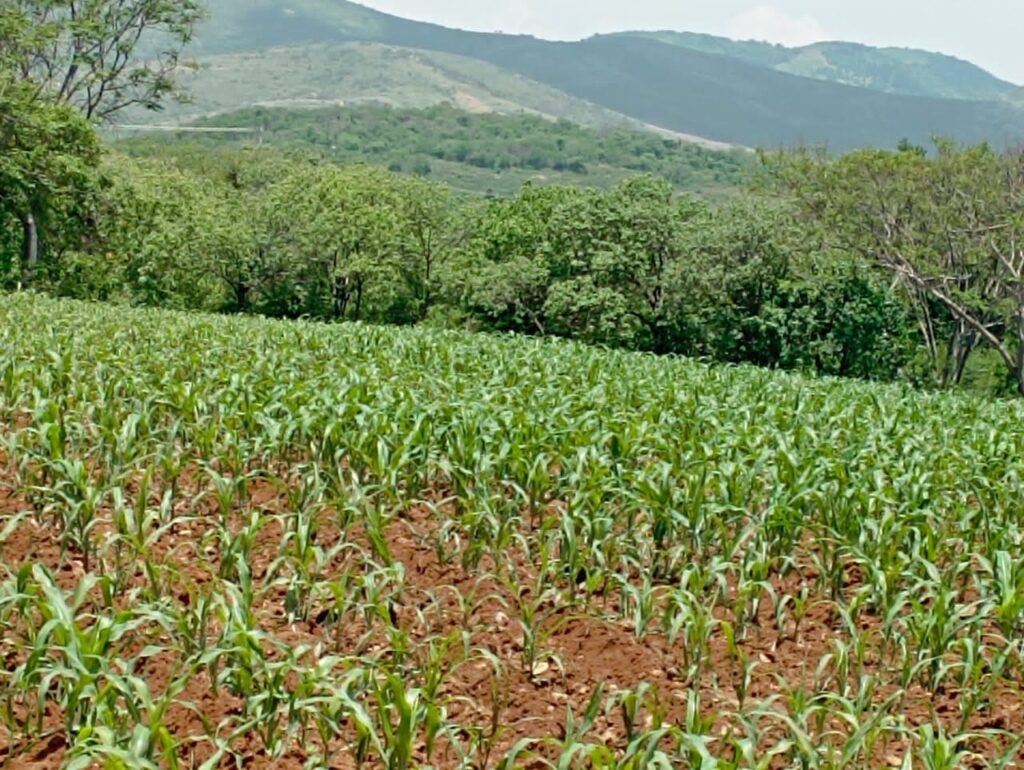Authors: Júlia Prat, Rosa Jorba
This article is also available in Spanish
“Territory is much more than a physical space; it is a source of nourishment, culture, spirituality, and organization.”
This article is based on the reflections shared by Rosalinda Dionicio, an Indigenous lawyer, activist, and environmental defender in San José del Progreso, Oaxaca, Mexico. In our conversation, Rosalinda shared her personal experience as a community activist, as well as a profound insight into the meaning of territory and the multiple challenges facing Indigenous communities in Mexico in the face of the expansion of extractive megaprojects and the concentration of political and corporate power.
Rosalinda belongs to a Zapotec community organized by traditions and customs, where structures such as the Assembly, community offices, and tequio (unpaid collective labor) continue to be fundamental pillars of the social fabric. Her community has been characterized by historical resistance to territorial invasions, from the time of the landowners to the present day. Her family history—particularly the influence of her grandparents and parents—instilled in her from an early age a profound conviction: territory is not a commodity, but the root of life, identity, and collective dignity.

For Rosalinda, defending territory not only implies physically resisting the imposition of megaprojects or the logic of dispossession, but also dismantling the political and economic monopolies that threaten the autonomy of indigenous peoples. This autonomy cannot be understood in individual terms; it must, by definition, be collective, linked to processes of community organization that reconnect with ancestral practices and a sustainable vision of how to inhabit the world.
In this sense, territory acquires an ecological, political, and spiritual meaning. It is a source of food—crops such as corn, beans, and squash are grown here, and wild plants such as quintoniles and chepiles are used—but it is also a space for cultural reproduction and solidarity practices. “This ancestral relationship involves not only planting, but also sharing: people help each other with the harvest, without the need for money,” Rosalinda explains.

Therefore, Rosalinda and her family believe that caring for the land also means respecting its natural cycles, avoiding pesticides, conserving native seeds, and rejecting GMOs. These practices are not merely agricultural: they constitute an act of resistance against cultural homogenization and the loss of food sovereignty. The defense of the territory is, therefore, a struggle for life, for respect for the environment, and for a justice that cannot be separated from memory, identity, and community.
Impact of mining in San José del Progreso
The arrival of the Canadian mining company Cuzcatlán, a subsidiary of the Canadian company Fortuna Silver Mines, in 2006 marked a turning point in the recent history of San José del Progreso. The mining project consists of the intensive extraction of silver and gold using highly polluting techniques, which have led to the poisoning of water sources, the destruction of farmland and serious health problems for the population.
In addition, the mining company imposed itself without prior consultation, in open violation of fundamental rights enshrined in international instruments such as Convention 169 of the International Labor Organization (ILO) and the United Nations Declaration on the Rights of Indigenous Peoples (2007).
Specifically, Article 32.2 of the ILO, which establishes that “States shall consult and cooperate in good faith with the indigenous peoples concerned through their own representative institutions in order to obtain their free and informed consent prior to the approval of any project affecting their lands or territories and other resources, particularly in connection with the development, utilization or exploitation of mineral, water or other resources”. These principles not only enshrine the right of indigenous communities to be consulted, but also recognize their sovereignty to decide their development priorities, to conserve their lands, territories and other resources, and to obtain their free and informed consent prior to the approval of any project affecting their lands or territories and other resources.

The implementation of the mining project created a deep fracture in the social fabric. Usufruct agreements were signed with ejidatarios (communal landowners), allowing the use of communal plots, and municipal permits were obtained for exploration activities. However, as Rosalinda Dionicio, a direct witness to the process, explains, many of these agreements were signed by illiterate people, using fingerprints instead of signatures and without a real understanding of the content and implications of the agreements. In her own words, “wills were bought, the community was divided, and when the inhabitants began to inform themselves, they discovered that concessions had already been granted for 50 years, extendable for another 50.”.
In this context, access to information became a central axis of community resistance for Rosalinda. “The defense of the territory,” she maintains, “cannot be exercised without clear and transparent knowledge of the projects that threaten it.” Informing the population, translating legal and technical terms into understandable language, and disseminating the content of the concessions became an urgent and political task. The lack of information not only led to dispossession but also weakened collective response capacities, generating fear, demobilization, and mistrust, leading to an internal crisis. Many refused to engage in activist struggles out of fear or because they had already signed contracts, which weakened the social fabric.
According to Rosalinda, social cohesion is no longer the same: the population is divided into two camps: those against mining and those in favor of the project. Therefore, Rosalinda understands the right to information as much more than a legal requirement. It is also a fundamental tool for restoring community sovereignty and rebuilding the damaged social fabric.
Indigenous women’s activism
Beyond the territorial, environmental and political impacts, the irruption of the mining project revealed profound gender inequalities. In this hostile context, women face not only institutional and corporate violence, but also multiple barriers due to the fact that they are women in activist spaces historically dominated by men. Rosalinda Dionicio, like many other women defenders, embodies an intersectional struggle where gender, indigenous identity and territorial defense converge, reinforcing the need to make visible and value the crucial role of women in community resistance processes.
Rosalinda began her activism at the age of 24, being the only woman in a group of men. Although she was initially accepted, she was quickly subjected to criticism, rumors and defamation for her public participation and for occupying spaces considered masculine. Even so, her presence was not an isolated exception. Women have played and continue to play a fundamental role in the struggles for the defense of the territory, assuming key responsibilities in the organization and within the spaces of resistance.
In the struggle against the Cuzcatlán mining company, the violent eviction of May 6, 2009, was an emblematic example. At that time, it was mostly women who held the camps, organized day and night guards and resisted in the territory while the men were in the camps. As a result, they were repressed with helicopters and police forces, as if they were criminals. Many were persecuted and blacklisted, which demonstrates the level of state repression against those defending the land.

Rosalinda’s experience illustrates how land defense cannot be understood without an intersectional perspective. It confronts not only the power of extractive companies and state connivance, but also a patriarchal system that seeks to silence women’s voices in public spaces. The struggle is of enormous proportions, as it confronts not only the power of large international capitals involved in
gold and silver extraction, but also an entire system of justice, healthcare, and government that, far from guaranteeing the protection of people’s rights, suffocates them in a sea of indifference, bureaucracy, discrimination, and impunity. Her commitment to the rights of her community, therefore, challenges both the economic order and gender hierarchies, revealing a profoundly transformative form of leadership.
Hope and Yearning for a Strong Community
The horizon Rosalinda envisions for her community is deeply rooted in the desire for recovery and autonomy. Her hope is clear: that the mining company will definitively withdraw from the territory and that the community can reorganize itself from its own structures and consensus.
Rosalinda envisions a future in which San José del Progreso will once again be a space of unity, with full autonomy to decide its own destiny, where the assembly is respected and the pillars of community are restored. In her words, “there is a great desire for new generations to grow up with opportunities, roots, dignity, and without fear of being displaced”.
Within this framework, Rosalinda affirms that the defense of the territory does not fall solely on activists; it is also built on everyday life.